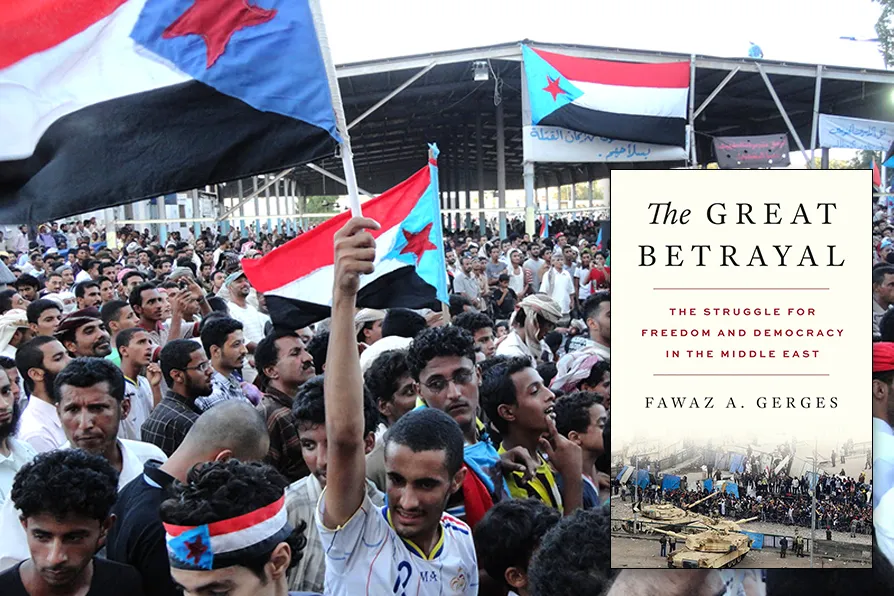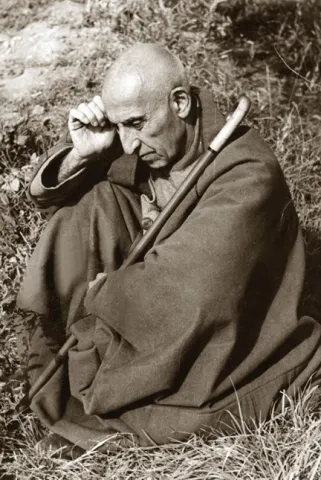JOHN GREEN, MARIA DUARTE and ANGUS REID review Fukushima: A Nuclear Nightmare, Man on the Run, If I Had Legs I’d Kick You, and Cold Storage
GUILLERMO THOMAS is intrigued by a history of the Middle East that demonstrates how promising post colonial beginnings were snuffed out by Western imperialist interests

 Yemeni Socialist Party protesters in Aden, Al Mansoora during the Arab Spring 2011, calling for the secession of South Yemen from the North. [Pic: AlMahra/CC]
Yemeni Socialist Party protesters in Aden, Al Mansoora during the Arab Spring 2011, calling for the secession of South Yemen from the North. [Pic: AlMahra/CC]
The Great Betrayal: The Struggle for Freedom and Democracy in the Middle East
Fawaz A. Gerges, Princeton University Press, £30
THAT the peoples of the Middle East have been let down, stabbed in the back, robbed of the freedoms and rights, is something most people can agree on. How that has happened, why and who is responsible is the subject of much debate. This book is one of many published since the Arab Springs of 2010-2012 and 2018-19, that seeks to address this.
The author highlights the interaction of three key forces : foreign power intervention, traditional and modern authoritarian rule, and the agency of everyday people.
He applies this approach to over a century of history from the end of the Ottoman Empire, to include European and then US imperial interventions and occupation, the Iranian revolution, the two phases popular uprisings that kicked off 15 years ago, touching briefly on the overthrow of Assad and the Israeli Gaza Genocide.
The long arm of Washington looms very large in the betrayal of region’s peoples. While Britain and France’s ideological cover was their civilising mission, in the post World War II period the iron fist of the US was gloved in the velvet of democracy and human rights. What all Western powers had in common, since the late 1900s, was the “backing autocrats in the name of stability” and, after the second world war, Israel’s occupation of Palestine.
The author is unsparing about the Middle Eastern leaders themselves, arguing they often did have genuine choices to resist imperialism and develop democratic states that provided for their peoples, yet chose not to. Instead, they hoarded power and wealth for themselves, resorting to ever more authoritarian and violent means to hold on to power, impoverishing their nations by abandoning state-led development in favour of backward, crony capitalism.
Gerges states: “Since the 1970s autocrats in the region prioritised economic liberalisation at the expense of political liberalisation and representation, seeking to maintain control while wooing foreign investment and neglecting social security and justice.”
Yet it wasn’t always so, he admits. There were promising post-colonial beginnings but they were quickly snuffed out by Europe and the US: “The first generation of post-independence Middle Eastern leaders like Mossadegh, Nasser and Saudi King Faisal … defended the dignity of their people and nations,” in contrast to “today’s Arab rulers [who] fear their people and depend on external support for political survival.”
The most dramatic example of what happened in between was the overthrow of Iran’s first democratically elected prime minister in 1953, after having taken the fateful move to nationalise the foreign-owned oil industry in 1951, and his replacement by the brutal dictatorship of the Shah, as the author recounts.

Mossadegh wouldn’t have been elected without the agency of the people, and it is this third key factor, which the book purports to show is present throughout the history of the region he covers, despite racist, orientalist stereotypes to the contrary. This is also perhaps the most disappointing part of the book.
The books lacks insight into the dynamics and, at times, mistakes the impact of popular struggles. For example, the role of industrial battles and trade unions in the Arab Springs, revolts often misrepresented (in Western media at least), as a “Facebook” revolution.
Or how the Syrian people overthrew of the Syrian regime in December 2024: this is his assertion but anybody following the news will know it was a Turkish-backed military campaign by a terrorist organisation proscribed by the UK, UN and US, and nothing since suggests a revival of civil society and democracy is taking place. Rather we are witnessing a further descent into violence and chaos, stoked by US-backed Israel and its military interventions.
The book recounts how the US and its proxy regimes in the region promoted Islam, particularly the ultra conservative Saudi Wahhabism, as a bulwark against communism and other secular and democratic forces that threatened their interests. So too the cynical use of divide and rule (ethnic, tribal, religious) first by European colonial powers, then the US and their puppet regimes. The dire consequences of both policies for development, human rights, peace and security are still being felt today, the author shows.
The sad facts today are whether it is the century-old quest for cheap energy, efforts to seek investment and sell arms to Gulf states, to control immigration to Europe or combat terrorism, the West still prefers to engage with heavily armed autocratic regimes all the while spouting hypocritical double speak. During his visit to Syria in July 2025, David Lammy talked of the importance of “inclusive and representative political transition.”
But in a multipolar world, amid the rise of the China and the other Brics, Western domination is under challenge like never before, so new strategies must be applied. Gerges writes: “Although the US can no longer unilaterally impose its will and dominate the Middle East, it has been trying to compensate for its relative decline and retrenchment from the region by setting up an empire by proxy,” through a regional grouping centred on Israel and pro-Western Arab states to “contain” Tehran and “ultimately regime change in Iran.”
This is now playing out today with the genocide in Gaza and further dangerous military escalation in the region as Trump joins Netanyahu in his bombing campaign against Iran on the basis of an Iraq war-style dodgy dossier that Tehran is developing WMDs.
By the author’s own admission one can feel rather depressed about prospects for the peoples of the region. Yet he professes optimism, putting his faith in the “spirit of resistance and resilience” of the people, from the Arab Springs to the unwavering determination of the Palestine people to defend their land and secure self-determination.
It is hope many progressive and people of good will share.









